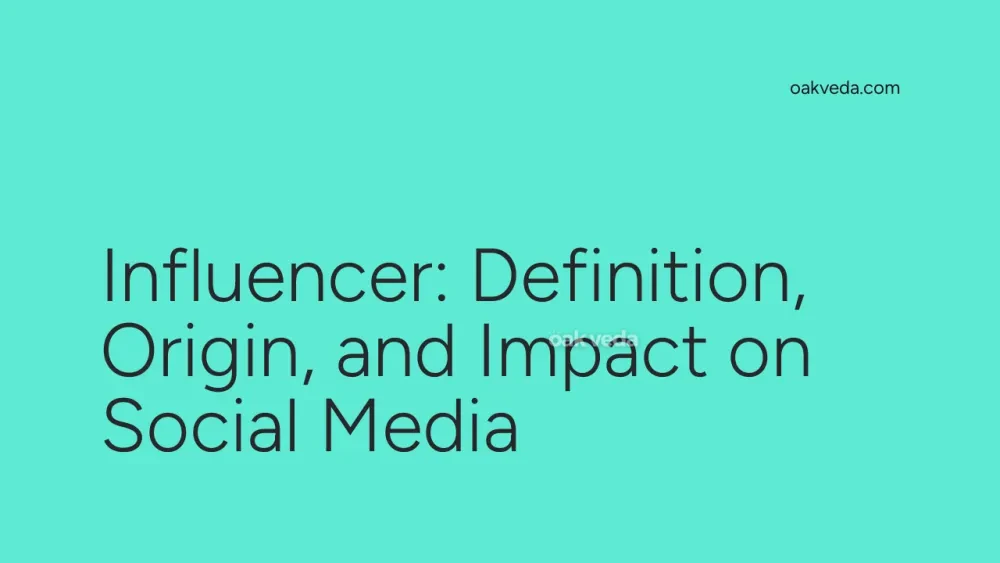
What is an Influencer?
An influencer is a person who has cultivated a significant and engaged following on social media platforms, wielding the power to sway the opinions, behaviors, and purchasing decisions of their audience. These digital trendsetters typically specialize in specific niches such as fashion, beauty, fitness, travel, or technology, leveraging their expertise and charisma to build a loyal community of followers.
Origin and Development of Influencers
The concept of influencers can be traced back to the early days of social media, but it gained significant traction in the mid-2010s. As platforms like Instagram, YouTube, and later TikTok grew in popularity, individuals began to amass large followings by sharing engaging content. Brands soon recognized the potential of these social media personalities to reach and influence consumers, leading to the birth of influencer marketing.
How Influencer Marketing Works
Influencer marketing revolves around the collaboration between brands and influencers to promote products or services. The process typically involves:
- Identification: Brands identify influencers whose audience aligns with their target market.
- Outreach: Companies contact influencers to propose partnerships.
- Collaboration: Influencers create content featuring the brand's products or services.
- Distribution: The content is shared across the influencer's social media channels.
- Engagement: Followers interact with the content, potentially leading to increased brand awareness and sales.
Types of Influencers
Influencers are often categorized based on their follower count:
- Nano-influencers: 1,000 - 10,000 followers
- Micro-influencers: 10,000 - 100,000 followers
- Macro-influencers: 100,000 - 1 million followers
- Mega-influencers: Over 1 million followers
Each category offers unique benefits in terms of reach, engagement rates, and cost-effectiveness.
Popular Examples of Influencers
Some well-known influencers across various niches include:
- Chiara Ferragni (Fashion)
- PewDiePie (Gaming)
- Kayla Itsines (Fitness)
- James Charles (Beauty)
- Murad Osmann (Travel)
These individuals have built personal brands that resonate with millions of followers worldwide.
Impact of Influencers on Social Media Culture
Influencers have significantly shaped social media culture by:
- Setting trends in fashion, lifestyle, and consumer behavior
- Democratizing content creation and personal branding
- Shifting advertising paradigms from traditional media to social platforms
- Fostering niche communities and subcultures
- Influencing public opinion on various topics, including social issues
Controversies Surrounding Influencers
The rise of influencer culture has not been without controversy:
- Authenticity concerns: Questions about genuine product endorsements versus paid promotions
- Disclosure issues: Lack of transparency in sponsored content
- Mental health impacts: Pressure to maintain a perfect online image
- Fake followers and engagement: Inflated metrics through artificial means
- Influencer fatigue: Oversaturation of sponsored content leading to audience disengagement
How Brands Leverage Influencers
Brands utilize influencers in various ways:
- Product launches: Generating buzz around new offerings
- Brand awareness: Increasing visibility among target demographics
- Content creation: Obtaining high-quality, authentic content for marketing campaigns
- Social proof: Leveraging influencers' credibility to build trust with consumers
- Driving sales: Using affiliate links or discount codes to track influencer-driven purchases
Future Trends in Influencer Marketing
The influencer landscape continues to evolve:
- Micro and nano-influencers: Increased focus on smaller, highly engaged audiences
- Long-term partnerships: Brands forming deeper, ongoing relationships with influencers
- Video content dominance: Short-form video platforms like TikTok gaining more prominence
- Virtual influencers: Computer-generated personalities entering the influencer space
- Authenticity and transparency: Greater emphasis on genuine connections and clear disclosure of partnerships
FAQs about Influencers
-
How do influencers make money? Influencers generate income through sponsored posts, affiliate marketing, merchandise sales, and brand partnerships.
-
Are influencers considered celebrities? While some influencers achieve celebrity status, most are considered "micro-celebrities" within their niche communities.
-
How can someone become an influencer? Building an influencer career involves consistently creating quality content, engaging with followers, and developing expertise in a specific niche.
-
Are there regulations for influencer marketing? Many countries have implemented guidelines requiring influencers to disclose paid partnerships and sponsored content.
-
What metrics are important for influencers? Key metrics include follower count, engagement rate, reach, and conversion rate for sponsored content.
In conclusion, influencers have become a powerful force in shaping social media culture and digital marketing strategies. As the landscape continues to evolve, authenticity, transparency, and genuine connections with audiences will likely become increasingly important factors in influencer success.
You may be interested in:

